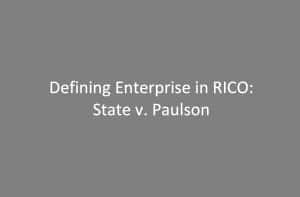Defining Enterprise in RICO: State v. Paulson
Recently, the Minnesota Court of Appeals looked at the definition of enterprise within the meaning of racketeering statute in State v. Paulson. The RICO Act (Racketeer Influenced and Corrupt Organizations Act) includes a definition of “enterprise”. It is defined as “a group of persons collectively participating in or authorizing a pattern of criminal activity and deriving proceeds from the activity.” In this case, the district court ruled that no enterprise involvement within the RICO Act resulted in the state not having probable cause to charge under this act.
Factually in this case, Paulson worked as a district manager at an Outsourced Sales Leadership (OSL) which was a corporation that sold cell phones in retail stores. Paulson and seven other employees were charged with making fraudulent purchases. The scheme of the fraudulent purchases was that an employee would bring in a person or use another person’s information to purchase expensive phones on an installment plan. Once the first payment was made and the phones were in their possession, they would then resell them at or near retail value. This benefited all employees who conducted the scheme, the team leaders, and the district manager Paulson.
Paulson’s former employees testified to his knowledge surrounding the fraudulent purchases. One former employee testified that he became aware of the significant increase in sales by a specific sales representative. He not only was aware of it, but he also investigated and found that the sales representative had been selling the same person multiple high-end phones. This employee then informed Paulson about the multiple high-end sales to the same person as a possible credit mule. Paulson told the employee that they could not tell if sales involved a credit mule or not. However, this seemed odd to the employee because their store normally for the most part had sales for inexpensive phones rather than high-end ones. This employee also noticed this pattern in another sales representative and again informed Paulson. Paulson replied by saying that he should proceed with the sales even if he thought credit mules were involved.
The Court of Appeals distinguished that OSL did not need to be engaged in, involved with, or aware of the criminal activity for there to be a racketeering charge against their employees. An enterprise under the RICO Act only requires that a group of people is collectively participating in criminal activity it does not need to meet the definition of a physical enterprise. A physical enterprise is defined under a different statute and is not the correct definition to be applied here which is a sole proprietorship, partnership, corporation, etc. because Paulson was charged under the RICO Act which defines an enterprise differently.
Also, the court found that there was probable cause to charge under the RICO Act based on the statements of the former employees which showed a probability that criminal activity was occurring, and Paulson was involved and aware. The need to charge under probable cause is a lower burden than proving a crime occurred. Probable cause only requires a probability or a substantial chance of criminal activity not an actual showing of the activity. The court was able to find this because of the statements at a prior hearing. As a result, the Court of Appeals reversed the dismissal finding there was probable cause because of the statements made on the record and Paulson fitting under the enterprise meaning of the RICO Act.
Robert H. Ambrose is a criminal defense lawyer and DWI lawyer in Minnesota. Minnesota. Super Lawyers named him Super Lawyer the past two years and a Rising Star the six years prior. He has been an adjunct professor at the University of Minnesota Law School for the past six years. Criminal Defense Lawyer Woodbury MN; Fraud Attorney St. Paul MN; and Criminal Appeals Lawyer Minnesota.

